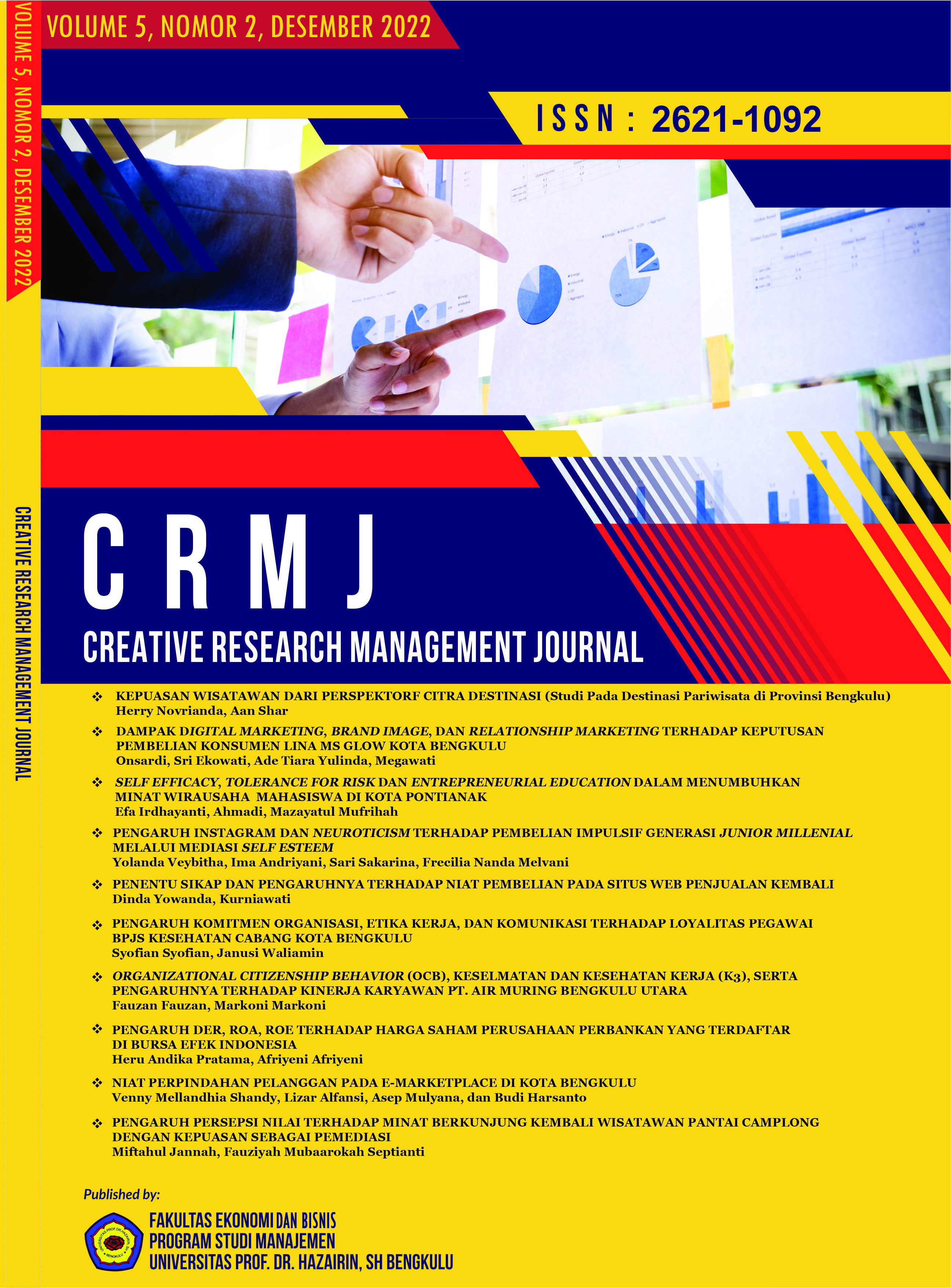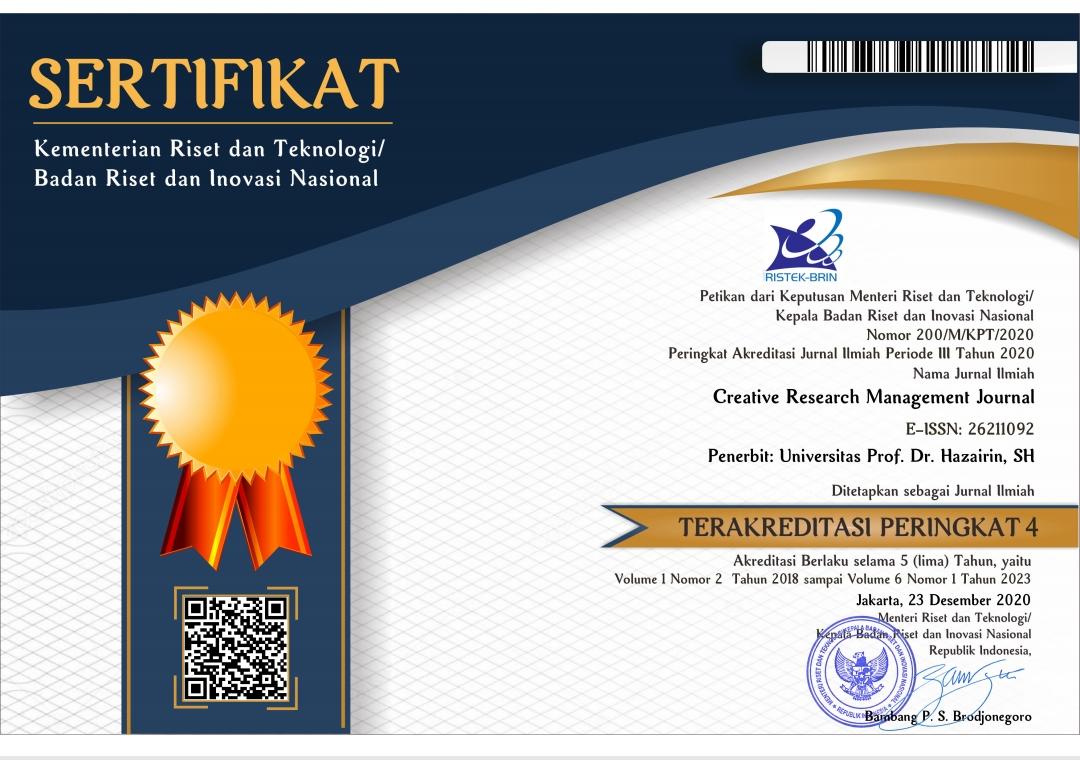SELF EFFICACY, TOLERANCE FOR RISK DAN ENTREPRENEURIAL EDUCATION DALAM MENUMBUHKAN MINAT WIRAUSAHA MAHASISWA DI KOTA PONTIANAK
DOI:
https://doi.org/10.32663/crmj.v5i2.3066Kata Kunci:
Self Efficacy, Tolerance For Risk, Entrepreneurial Education, Entrepreneurial InterstAbstrak
The purpose of this study is to identify the effect of self-efficacy, tolerance for risk, and Entrepreneurship education in growing student entrepreneurial interest in Pontianak City. This study uses a causative type of research, namely the type of research with the characteristics of the problem in the form of a causal relationship between two or more variables. Sampling used purposive sampling method. Questionnaires were distributed to 200 respondents. The returned and usable questionnaires were 139 questionnaires. The results of the study are self-efficacy, tolerance for risk and Entrepreneurship education have a positive and significant effect on student entrepreneurial interest in Pontianak City. This research is expected to contribute to educators in formulating teaching materials and contributions to the government as input in making programs related for producing many young entrepreneurs.
Referensi
Adi, S. (2000). Kewiraswastaan. Ghaliab Indonesia, Jakarta Barat.
Adnyana, I. G. L. A., & Purnami, N. M. (2016). Pengaruh Pendidikan Kewirausahaan, Self Efficacy dan Locus of Control pada Niat Berwirausaha. E-Jurnal Manajemen Unud, 5(2), 1160–1188. https://ojs.unud.ac.id/index.php/Manajemen/article/view/16350/12318
Andini, D. P., & Engriani, Y. (2019). Pengaruh Self-Efficacy, Tolerance for Risk, dan Kebebasan dalam Bekerja terhadap Minat Entrepreneurship Mahasiswa Universitas Negeri Padang. Jurnal Kajian Manajemen Dan Wirausaha, 1(4), 34–47. https://doi.org/10.24036/jkmw0278980
Badan Pusat Statistik. (2021). Tingkat Pengangguran Terbuka (PTP). https://www.bps.go.id/pressrelease/2021/11/05/1816/agustus-2021--tingkat-pengangguran-terbuka--tpt--sebesar-6-49-persen.html
Bandura, A. (1997). Self-efficacy: The exercise of control. In Self-efficacy: The exercise of control. W H Freeman/Times Books/ Henry Holt & Co.
Fahmi, I., & Askir. (2013). Kewirausahaan Teori, Kasus dan Slusi. Alfabeta. https://opac.perpusnas.go.id/DetailOpac.aspx?id=913337#
Hair, J. J. F., Black, W. C., Babin, B. J., Anderson, R. E., Black, W. C., & Anderson, R. E. (2019). Multivariate Data Analysis (Eighteen E). Cengage. https://doi.org/10.1002/9781119409137.ch4
Kusmintarti, A., Riwajanti, N. I., & Asdani, A. (2017). Pendidikan Kewirausahaan dan Intensi Kewirausahaan dengan Sikap Kewirausahaan sebagai Mediasi. Jurnal Riset Dan Aplikasi Akuntansi Dan Manajemen, 2(2), 119–128. https://doi.org/10.18382/jraam.v2i2.160
Lestari, P. A., & Sisilia, K. (2016). Analisis Atribut Tolerance for Ambiguity dan Risk tolerance Pada Kepribadian Kewirausahaan Mahasiswa S1 Administrasi Bisnis Telkom University. E-Proceding of Management, 551–556. https://openlibrarypublications.telkomuniversity.ac.id/index.php/management/article/view/3224/3053
Lunenburg, F. C. (2011). Self-Efficacy in the Workplace: Implications for Motivation and Performance. International Journal of Management, Business, and Administration, 14(1), 1–6. http://www.nationalforum.com/Electronic Journal Volumes/Lunenburg, Fred C. Self-Efficacy in the Workplace IJMBA V14 N1 2011.pdf
Luthans, F., Youssef-Morgan, C. M., & Avolio, B. J. (2015). Psychological capital and beyond. In Psychological capital and beyond. Oxford University Press.
Melyana, I. prima, Rusdarti, & Pujiati, A. (2015). Pengaruh Sikap dan Pengetahuan Kewirausahaan Terhadap Kesiapan Berwirausaha Melalui Self-Efficacy. Jurnal Of Economic Education, 4(1), 8–13. http://journal.unnes.ac.id/sju/index.php/jeec
Primandaru, N., & Adriyani, B. (2019). Pengaruh Entrepreneurial Education, Risk tolerance Dan Self Efficacy Terhadap Entrepreneurial Intention Pada Mahasiswa. Jurnal Bisnis & Manajemen, 19(1), 11–24. https://doi.org/10.20961/jbm.v19i1.30918
Roring, A. G., Adolfina, & Taroreh, R. (2022). Pengaruh Pendidikan Kewirausahaan, Self Efficacy dan Locus ff Control Terhadap Niat Berwirausaha (Studi Kasus Pada Mahasiswa Tahun. Jurnal LPM Bidang EkoSosBudKum (Ekonomi, Sosial, Budaya, Dan Hukum), 5(2), 263–272. https://ejournal.unsrat.ac.id/index.php/lppmekososbudkum/article/view/37596
Rustika, I. M. (2012). Efikasi Diri: Tinjauan Teori Albert Bandura. Buletin Psikologi, 20(1–2), 18–25. https://jurnal.ugm.ac.id/buletinpsikologi/article/view/11945/8799
Sandhu, M. S., Sidique, S. F., & Riaz, S. (2011). Entrepreneurship barriers and entrepreneurial inclination among Malaysian postgraduate students. International Journal of Entrepreneurial Behaviour and Research, 17(4), 428–449. https://doi.org/10.1108/13552551111139656
Wongso, R., Kohardinata, C., Wirawan, D., & Radianto, D. (2020). Pengaruh Risk Tolerance, Lingkungan Keluarga, dan Motivasi Berwirausaha Terhadap Mental Kewirausahaan Mahasiswa. PERFORMA: Jurnal Manajemen Dan Start-Up Bisnis, 5(5), 369–378. https://journal.uc.ac.id/index.php/performa/article/view/1813














